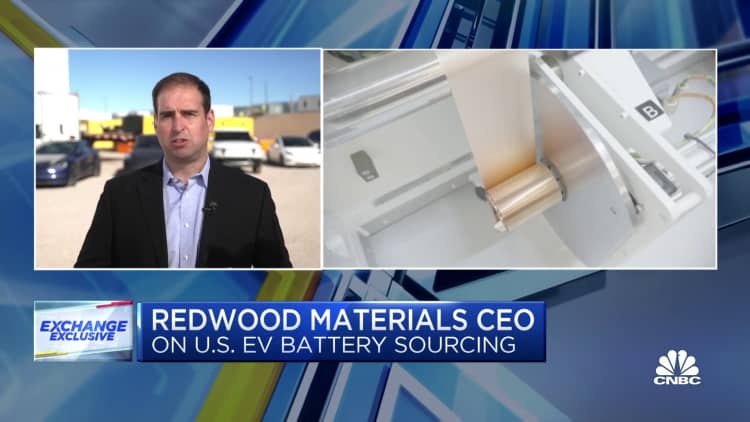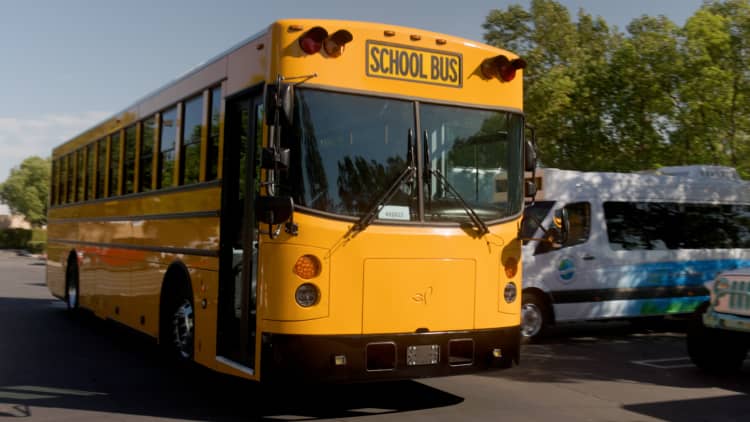The U.S. Environmental Protection Agency on Wednesday proposed new tailpipe emissions limits that could require as much as 67% of all new vehicles sold in the U.S. by 2032 to be all-electric, representing the country's most aggressive climate regulations to date.
The proposed limits would surpass President Joe Biden's previous commitment to have EVs make up roughly 50% of cars sold by 2030 and accelerate the country's clean energy transition. The limits would also substantially reduce climate-changing emissions from the transportation sector, the largest source of U.S. greenhouse gases.
Despite a rise in EV sales in the U.S. in recent years, EV sales accounted for only 5.8% of all the 13.8 million new vehicles sold in the country last year, an increase from 3.1% the year before, according to data from the Kelley Blue Book. The U.S. is the world's third-largest market for EVs behind China and Europe.
The limits wouldn't require a specific amount of annual EV sales but rather set pollution standards for cars and trucks, which would force the auto industry to sell a lot more EVs in order to meet the requirements. The agency projects the standards would avoid nearly 10 billion tons of carbon emissions through 2055, equivalent to more than twice the total U.S. carbon emissions in 2022.
EPA Administrator Michael Regan is set to announce the proposed limits later today at the agency headquarters in Washington. The limits will be made available for public review and comment and will likely face legal challenges.
"This is a very ambitious proposal," Regan said during a briefing with reporters on Tuesday. "This proposal solicits a number of ways to achieve these goals and we plan to strategically engage all our stakeholders."

Urgently replacing gas-burning vehicles with all-electric models would help the Biden administration achieve its commitment to reducing U.S. greenhouse gas emissions by at least 50% by the end of the decade and reach net-zero emissions by 2050.
Depending on the compliance pathways manufacturers select to meet the standards, the EPA said, it projects that EVs could account for 67% of new light-duty vehicle sales and 46% of new medium-duty vehicle sales in model year 2032.
However, the proposed limits would present a slew of challenges for automakers.
Auto companies are already investing billions in factories and battery technology to support EVs. But a rapid adoption of EV technology would require more widespread and reliable charging infrastructure and more materials necessary for EV batteries, among other things.
John Bozzella, CEO of the Alliance for Automotive Innovation, a trade association that represents major automakers, said in a statement that the EPA's proposed regulation "is aggressive by any measure" and sets "very high" automotive electrification goals over the next few years.
The group has said that charging stations need to become more reliable and ubiquitous, EVs must become more affordable and domestic critical mineral supply chains have to be set up.
"The question isn't can this be done, it's how fast can it be done, and how fast will depend almost exclusively on having the right policies and market conditions in place to achieve the shared goal of a net zero carbon automotive future," Bozzella said.
The Biden administration's efforts to raise EV sales could also face opposition from consumers, who will ultimately need to be willing and able to buy EVs.
New electric vehicles currently cost an average of more than $58,000, according to Kelley Blue Book estimates, a price that's well above the industry average of just under $46,000.
Under the Inflation Reduction Act passed last year, tax credits provide a purchase incentive of up to $7,500 for car buyers in order to boost EV adoption and affordability. However, starting April 18, new Treasury Department requirements will result in fewer new EVs that will be eligible for the full tax credit.
Environmental groups praised the EPA's limits as necessary to addressing climate change and mitigating air pollution, especially for marginalized communities that live near major highways.
"Every single day, millions of Americans are forced to breathe deadly vehicle pollution spewed from combustion vehicles on the road," Sierra Club Executive Director Ben Jealous said in a statement. "Strong federal action to address this devastating reality is a must."
A poll this week found that nearly half of Americans say it's unlikely they would purchase an EV as their next car, citing the lack of charging options and the high costs as primary barriers to going electric. And just 35% of respondents support setting stricter auto emissions rules to encourage automakers to boost EV sales.
The Biden administration earlier this year set a goal to put at least 500,000 EV charging stations on U.S. roads by 2030 and announced a slate of initiatives to help make that a reality, including commitments from companies that build and operate charging networks, such as Tesla, General Motors, Ford and ChargePoint. Still, experts say that millions of electric vehicle charging stations are needed.
The White House has also set aside $5 billion from the 2021 bipartisan infrastructure package to help states build a network of EV charging stations along designated alternative fuel corridors on the national highway system.



